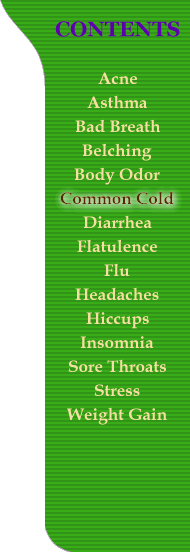| Headache.
Stuff nose. Cough. Fever. Itchy eyes. Sore throat. Muscle aches. If you're
like most people, you know the symptoms of the common cold all too well.
Although most people tried everything from tissues and vitamin C to over-the-counter
decongestants and herb teas - there is no cure for the common cold.
Colds, also called upper respiratory infections, are caused by hundreds of different viruses. But we don't have any drugs that can kill or inhibit theses viruses. We have to depend on the body's natural defenses. The symptoms you experience as a cold are actually the body's natural immune response. In fact, by the time you feel like you're are coming down with a cold, you've likely already had it for a day and half. Many people believe the old adage, "Do nothing and your cold will last seven days. Do everything and it will last a week." While we may not be able to cure the common cold, the simple self care techniques that follow can help you feel more comfortable and speed healing. Drink plenty of fluids. Fluids keep the mucus thin. Colds can make you somewhat dehydrated and you don't even know it. Drink at least eight ounces of fluid every two hours. Cook up some chicken soup. One of the most beneficial our fluids you can consume when you have a cold is chicken soup. It was first prescribed for the common cold by rabbi/physician Moses Maimonides in twelfth-cenury Egypt and has been a favorite folk remedy ever since. A test was held to examine the effects of sipping hot and cold water as well as chicken soup on the clearance of mucus. Chicken soup place first, hot water second and cold water a distant third. Rest. Doctors disagree about whether or not you should take a day or two off from work when you come down with a cold. However, they do agree that extra rest helps. Staying away from the work site may be a good idea from a prevention standpoint, too. Your coworkers will probably appreciate your not spreading the cold virus around the office. You should also skip your normal exercise routine when you've got a cold. In fact, ge says, if you're feeling pretty bad, you should just head for bed. Stay warm. Staying warm may make you feel more comfortable, especially if you have a fever. Use a saltwater wash. The inflammation and swelling in the nose during a cold is caused by molecules called cytokines or lymphokines, which are made by the lymphocytes. Recent evidence has shown that if we can wash out those cytokines, it reduces the swelling and fluid production. It is recommended that you fill a clean nasal spray bottle with dilute salt water (one level teaspoon salt to one quart water) and spraying each nostril three or four times. Repeat five to six times per day. Gargle. Gargling with warm salt water (a quarter teaspoon salt in four ounces warm water) every one to two hours can soothe your sore throat. Salt water is an astringent that is very soothing to the inflamed tissues and it tends to loosen mucus. Consider vitamin C. If you decide to try boosting your vitamin C intake during a cold, don't overdo it. While vitamin C has been found to be relatively safe at doses of up to 10,000 milligrams per day, some people find vitamin C causes diarrhea at or above the 10,000-milligram level. Perhaps the safest way to get more vitamin C is to choose vitamin C-rich foods more often. Vaporize it. The steam from a vaporizer can loosen mucus, especially if the sputum is thick. It may also raise the humidity in the immediate area slightly, which may make you feel more comfortable. Stop smoking. Smokers have colds longer in duration than nonsmokers. If you chronically irritate the bronchial tubes while you have a cold, you're more likely to develop a complication like pneumonia. In addition to irritating the throat and bronchial tubes, smoking has been shown to depress the immune system. Since you have to depend on your own immune system rather than medicine to cure a cold, you'll wasn't ot to be in the best condition possible to wage the "cold" war. Maintain a positive attitude. Although mind-body science is in its infancy, some researchers suggest that a positive I-can-beat-this-cold attitude may actually stimulate the immune system. |
 |
|
|
What's Up Doc?
While most
colds can be effectively treated at home,
to be going away, but you suddenly develop a fever. (It may indicate pneumonia, which more likely to set in toward the end of a cold.) |
||